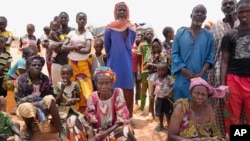A two-day meeting of officials from the Organization of Islamic Cooperation ended in Cameroon Friday with promises to help member countries deal with armed conflict, violent extremism, economic hardships and climate shocks. OIC officials acknowledge these issues, among others, have plunged a majority of civilians in the 57-member organization into poverty.
About 500 delegates from 57 countries attended the meeting in Cameroon, including foreign ministers, diplomats and high-ranking officials.
Most of the conference focused on the problems faced by member countries.
Boukary Sawadogo, Burkina Faso’s ambassador to Saudi Arabia and permanent representative of his country to the OIC, says he is satisfied that OIC member states have made very strong commitments to give direct assistance to nations that are tackling the root causes of conflicts, which are mainly poverty and hardships among civilians.
He says it is unfortunate that terrorism is surging in Burkina Faso with devastating consequences for its neighbors, Mali and Niger.
The OIC said it will assist Burkina Faso, Niger, Mali, Pakistan, Syria, Afghanistan, Somalia and Nigeria — the member countries with the highest death tolls from terrorism.
The OIC also promised a donors conference before the end of 2024 to help refugees in Cameroon, Chad and Nigeria fleeing terrorism.
In terms of economic programs, the OIC said it is sponsoring construction of a road linking Chad and Cameroon, and said a second phase of that road project will be announced by November.
The organization said it will also launch reforestation programs in Chad, Cameroon, Niger and Burkina Faso, where the desert is advancing.
On a broader scale, Gambian diplomat Mamadou Tangara says the participants agreed to develop transport and communications, which he said are key tools to fight poverty and insecurity.
"The development of our transport and communication infrastructures could enhance and consolidate the sustainable social and economic development including the creation and facilitation of different economic opportunities such as job creation and market access, safety and security services contributing to improved emergency response and crime reduction mechanisms," he said.
The OIC says it is finalizing negotiations for possible construction of a 4,000-kilometer Africa transcontinental railway linking Senegal and Sudan. The railway would connect Africa with the Atlantic Ocean, the Red Sea, Middle East and Asia and increase access to markets and reducing poverty.
The OIC says it will continue to address the repercussions of what the participants call the brutal Israeli aggression on the Palestinian people, promising to strengthen Palestinian resilience in defending their legitimate rights.
They emphasized the need for the OIC’s collective efforts to enact U.N. Security Council resolutions that call for an immediate and comprehensive cease-fire between Israel and Hamas, and sufficient and sustainable humanitarian aid to all parts of the Gaza Strip.
The OIC also said it will intensify humanitarian efforts and constructive dialogue in Afghanistan to end the ban on girls' education and women's work.




